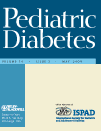Participant and parent experiences in the oral insulin study of the Diabetes Prevention Trial for Type 1 Diabetes
Abstract
Objective: To assess the experiences of participants and parents of children in the oral insulin study of the Diabetes Prevention Trial – Type 1.
Method: Before trial results were publicized, surveys were completed by 124 participants and 219 parents of children in the oral trial.
Results: Although most of those surveyed were positive about the trial, survey results suggest that participant perspective (adult, child, parent, and gender), study procedures, and beliefs about placebo vs. active drug assignment have important implications for planning future clinical trials. Parents and children reported greater distress, worry, and difficulty making the decision to join the trial compared with adult participants. Mothers and female participants were particularly interested in additional psychosocial support during the study. Random assignment was viewed negatively by both parents and children, and close observation for diabetes onset was viewed as the most favorable aspect of the study. Adherence to study procedures declined over time and behaviors outside the study protocol to prevent/delay diabetes onset were common, particularly among those who believed the participant was taking a placebo. Children and respondents who believed that the participant was taking the active drug expressed confidence in oral insulin’s ability to delay or prevent type 1 diabetes.
Conclusions: Although most participants were positive about the trial and many expressed optimism about the intervention’s potential for success, future trials need to address negative reactions to random assignment, the unique concerns of children and their parents, declining adherence, and behaviors – external to the trial – designed to delay or prevent diabetes.




